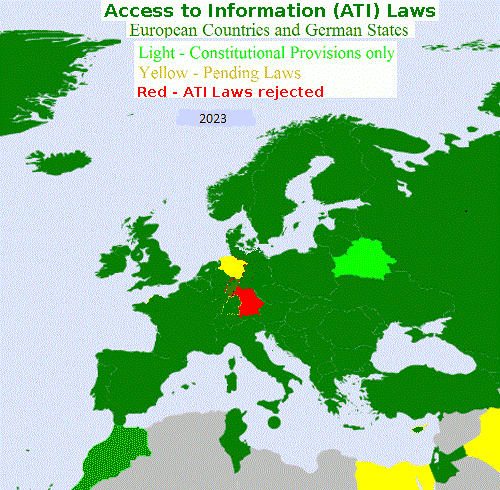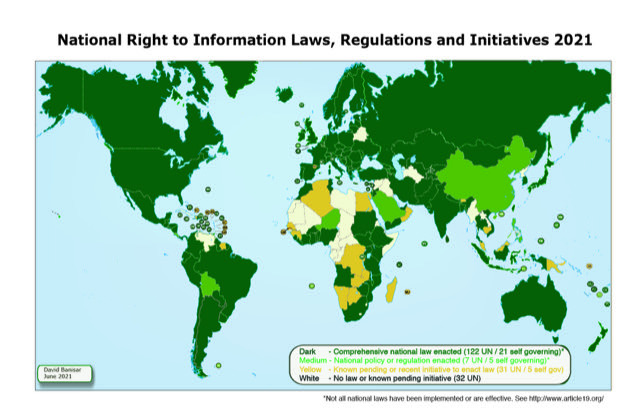 auf Deutsch
auf Deutsch
Who is responsible for the lack
of Freedom of Information in Germany?

 5. February 2003: This
Internet publication is a "hearing": Please send
comments to: walter.keim@gmail.com.
Have I forgotten somebody on the list below?
5. February 2003: This
Internet publication is a "hearing": Please send
comments to: walter.keim@gmail.com.
Have I forgotten somebody on the list below?
The human right of
Freedom of Information is found overall in the EU, in
Europe and developed countries all
over the world. Germany is (in federal agencies and 12 of 16
local Lander) nearly the only exception in Europe. As EU
citizen I have this right towards EU institutions, according to
the EU
Charter of Fundamental Rights (Article 42: Right of access to
documents). Why not in Germany?
I accuse:
- the minister of
interior Otto Schily, because he just proposed a draft
law in 2001 and did not finish the process because the
administration had objections. Freedom of Information is promised since
1998, but no proposal made to the parliament. (Revolt of the red tapes:
"Aufstand der Amtsschimmel". See magazine
"Zeit": http://www.zeit.de/2002/15/Aufstand_der_Amtsschimmel)
- The ministers of the German
federal cabinet did not propose a law to parliament,
saying this was because media
and citizens did not show enough interest.
- The government claims in its report on ICCPR: CCPR/C/DEU/2002/5
of 4 December 2002 in point 240 that Germany has
implemented Freedom of Information according to ICCPR
Article 19 (2). But this is wrong because access to
public documents is missing.
- The "bananas-minister"
for economy Müller because he stopped the coalition
parties, who tried to bring to parliament their own
law-proposal: http://www.heise.de/tp/deutsch/special/frei/12689/1.html.
This happened because chancellor Schröder obeyed the industry,
which did not want freedom of information: http://www.spiegel.de/spiegel/0,1518,200757,00.html.
Suggestion
for new guidelines.
- The federal parliament
Bundestag, because no
law is passed up to now: Nearly the only Parliament
in Europe not able to promote civil rights against
bureaucracy "Aufstand
der Amtsschimmel". The election 2002 gave a
majority to give freedom of information. Will the new
government follow up and the
parliament now give a law?
- The
parliament (Landtag) of Baden-Württemberg, because it
was too avaricious to give freedom of information: http://wkeim.bplaced.net/files/petition_bw_3.pdf
(much administration, not inconsiderable costs,
"erheblicher Verwaltungsaufwand, nicht unerhebliche
Kosten").
- Parlaments and governments because they denied access to
documents. Answers to petition complaints never discussed
human rights questions. Therefore access to documents was
asked for, to study the communication between parliament
and ministries. Access was refused:
- The parliament, government and
administration denies Germans the right to get an answer
from the administration. EU
Charter of Fundamental Rights gives a right of access
to documents (Article 42) and the Right to good
administration (Article 41), i. e. answer fairly within a
reasonable time. German administration has no obligation
to give reasons for its decisions and does not give these
rights to its citizens. Suggestions to translate
recommendations of the Council of Europe on freedom of
information and patients rights have not been answered: http://wkeim.bplaced.net/020106coe.htm
and http://wkeim.bplaced.net/filer/011223fischer.htm.
No reason is given.
- The German parliament and
government because laws
from the Third Reich are still in force. The allies
declared Hitlers dictatorial government illegal, but
forgot to abolish
the laws Hitler made. Lawyers have a monopoly about
legal counselling according to the Law
on legal advice (Rechtsberatungsgesetz
from
1935). In those days the law was given to exclude
Jewish lawyers after they were expelled from the lawyers
chamber and prevent that they give free advice. This law
is challenged with help of a constitutional
complaint (amendment
of 5.May.2000) by a judge who was punished, because he
gave free legal advice to friends. A
Jew working for a volontary organisation for integrating
refugees was also punished,
because
of legal
advice to Jewish immigrants. A complaint at the European
Court of Human Rights was filed 13. November 2003. Consumers
rights are violated.
- The constitutional court
refused to process the complaint
http://wkeim.bplaced.net/v-klage_en.htm on
freedom of information without giving any reasons. The
acknowledgement of human rights is only on paper. The
acknowledgement of Article 1 (2) GG is not more then
lip service (Lippenbekenntnis).
Germany was condemned in the case Vogt
v. Deutschland ( - 7/1994/454/535 - EuGRZ 1995, 590 - )
to have violated Freedom of opinion by the European Court
of Human Rights. But Germany
does not respect this and tries to neglect this
verdict. International law is not given precedence, as
the constitution requires (Article
25 GG). The Fundamental
Right of the of the EU Charter, to get an answer
giving a reason (Article 41), is removed
by the constitutional court even for petitions.
- Franz Joseph Stauß-epigone chancellor candidate Stoiber, who is selling himself as
"man
of the center", without promoting freedom of
information, common for Europe: http://wkeim.bplaced.net/020508stoiber.htm.
(In Bavaria the administration is not
"transparent" but civil servants "are
transparent": As only land in Germany the secret
service ("Verfassungsschutz") is contacted
before civil servants are hired, as decided 1972 as part
of the "Radikalenerlass",
an act that produced the so-called "berufsverbote".)
Germany was condemned in the case Vogt
v. Deutschland ( - 7/1994/454/535 - EuGRZ 1995, 590 - )
to take back an offer of this policy by the European
Court of Human Rights. But Germany
does not respect this and tries to neglect this
verdict in other similar cases.
- The German people, because it does
not through off "un-freedom" of information,
inherited from the authoritarian state of the past. The
acknowledgement of human rights Artikel
1 (2) GG is so far false. Voters (specially in the northern
part of Germany) elected September 2002 the coalition
parties who promised freedom of information. Will the
government and the parliament follow up the Coalition
Agreement of 2002?
- Summary for Germany: The Legislative,
Administrative und Judicative power does not only not
promote the human
rights (e. g. freedom of information), but pre-democratic
laws
are put higher than human rights, i. e. human
rights are violated.
The human right of freedom
of information is violated in the federal
republic and 12 of 16 Bundesländern: a UN
human right and basic
right of the Charter of the EU. When it
comes to Patients
rights the EU Charter and the European
Charter of Patients Rights is violated. What
kind of people are tolerating this, without (nearly)
anybody (but me) protesting? Am I the only real human
being in Germany?
International participants:
Questions:
Will the
coalition parties succeed to work out a draft law and present it to
parliament, to overcome the blockade of the bureaucracy and government against
the human right of Freedom of Information?
Will the petition on freedom of information: http://wkeim.bplaced.net/petition_ifg.htm
dated 21. December 2001 to the German Bundestag be answered? Will
civil rights be more important than objections of the "administration".
Will this petition at least be send over to the government?
Will the
administrative court (Verwaltungsgericht) promote an "area
of freedom, security and justice" with a "guarantee for the principles of
democracy and respect for human rights", which EU is building up according to
Com 2002/0247
?
The Council of Europe, does so far not
contribute with conventions: http://wkeim.bplaced.net/020106coe.htm
only Recommendations
(1981) which Germany has ignored. (2002: http://cm.coe.int/stat/E/Public/2002/adopted_texts/recommendations/2002r2.htm).
Has the Council of Europe started to work with a
convention? Will
the Commissioner for Human Rights of the CoE promote Freedom of
Information? Here is a Survey
on FOI in Europe.
Will the United Nations do, what they promise: To promote
freedom of information as human right: http://wkeim.bplaced.net/petition_un.htm?
Obviously the Special Rapporteur is committed. But this
committment of is so far not followed
up by the Petitions Unit. Will the Human
Rights Committee see that Germany reports false: http://wkeim.bplaced.net/files/031029EFIL.htm
?
Will the international public and community be
silent about this
development (ARTICLE19, EFIL)?
The Charter
of Fundamental Rights of the EU gives Freedom of Information
in Article 42, access to documents in Article 41 (2), the right
to complain in Article 43 (Ombudsman) and the right to answers
within reasonable time in Article 41 (1). The "European
Codex of god Administration" defines latest two months to get an
answer (Article 17). As EU-Citizen I
would like to ask: How long will the European
Parliament (Courrier du
Citoyen) look at that the human right of freedom of
information and other fundamental rights of the EU Charter are
violated. In other countries in Europe this is respected. I
become a second class citizen travelling to Germany.
I refer to the "European Parliament resolution on the situation as
regards fundamental rights in the European Union (2000)
(2000/2231(INI))" document A5-0223/2001. Point 3 "(n)otes that it is the particular
responsibility of the European Parliament (by virtue of the role
conferred on it under the new Article 7(1) of the Treaty of Nice)
and of its appropriate committee to ensure (in cooperation with
the national parliaments and the parliaments of the candidate
countries) that both the EU institutions and the Member States
uphold the rights set out in the various Chapters of the
Charter" Will the petition http://wkeim.bplaced.net/petition_eu.htm
be answered positive? In this draft
report 2003/2237(INI), 9 March 2004 (Chapter KK), the
EU Parliament states: "The European Parliament notes that in Germany there
is no law ensuring access to documents of public authorities at the national
(i.e. federal) level and that only four of the federal states have enacted such
legislation".
Walter Keim
E-mail: walter.keim@gmail.com
Support freedom of information: http://wkeim.bplaced.net/foi.htm,
http://wkeim.bplaced.net/petition_un.htm,
http://wkeim.bplaced.net/v-klage_en.htm
Support patients rights: http://wkeim.bplaced.net/patients.htm#e-mail
Old versions: 0.1,
Support Freedom of Information by
E-Mail to the European Commission and Council with a copy to the
European Parliament.
 Freedom of Information came 1766 to
Sweden, 1951
to Finland, 1966
to den USA, 1970 to
Norway and 1985 to
Denmark In 1981 the Council of Europe gave "Recommendation
No. R (81) 19" on the access to information held by
public authorities. A new Recommendation
Rec(2002)2 was adopted 2002. Both EU and nearly all countries
in the EU and Europe adopted such laws. However citizen rights
vary and there are no minimum standards. In order to keep up with
the international development freedom of information should be
strengthened in EU member states. Here is a petition to the European Parliament.
Freedom of Information came 1766 to
Sweden, 1951
to Finland, 1966
to den USA, 1970 to
Norway and 1985 to
Denmark In 1981 the Council of Europe gave "Recommendation
No. R (81) 19" on the access to information held by
public authorities. A new Recommendation
Rec(2002)2 was adopted 2002. Both EU and nearly all countries
in the EU and Europe adopted such laws. However citizen rights
vary and there are no minimum standards. In order to keep up with
the international development freedom of information should be
strengthened in EU member states. Here is a petition to the European Parliament.
Support Freedom of Information, by
the following E-Mail to the European Commission (click here):
I support the call to the
European Commission and Council for democratic and accountable
Freedom of Information laws on access to public documents in EU
and member states.
(You may change the text according to your needs).
Support FOI by E-Mail to the Federal
Government in Germany
Freedom of Information came 1951
to Finland, 1949 to
Sweden, 1966
to den USA, 1970 to
Norway and 1985 to
Denmark. In 1981 the Council of Europe gave "Recommendation
No. R (81) 19" on the access to information held by
public authorities. Germany is the only country in the EU without
such a law. In order to keep up with the international
development freedom of information should also be adopted in
Germany.
Support the German Freedom of Information Law, by
the following E-Mail to the German Government (click here):
I support the call to the
German Government for a democratic and accountable Freedom of
Information Law on access to public documents.
(You may change the text according to your needs).
Visitor No.  since 16. May 2002
since 16. May 2002
[Petitions] [Freedom of Information]
[Patients Rights in
Europe] [Human Right Violations in Germany] [Critique of Patients Rights
in Germany]
[Homepage]



 5. February 2003: This
Internet publication is a "hearing": Please send
comments to: walter.keim@gmail.com.
Have I forgotten somebody on the list below?
5. February 2003: This
Internet publication is a "hearing": Please send
comments to: walter.keim@gmail.com.
Have I forgotten somebody on the list below? Freedom of Information came 1766 to
Sweden, 1951
to Finland, 1966
to den USA, 1970 to
Norway and 1985 to
Denmark In 1981 the Council of Europe gave "Recommendation
No. R (81) 19" on the access to information held by
public authorities. A new Recommendation
Rec(2002)2 was adopted 2002. Both EU and nearly all countries
in the EU and Europe adopted such laws. However citizen rights
vary and there are no minimum standards. In order to keep up with
the international development freedom of information should be
strengthened in EU member states. Here is a petition to the European Parliament.
Freedom of Information came 1766 to
Sweden, 1951
to Finland, 1966
to den USA, 1970 to
Norway and 1985 to
Denmark In 1981 the Council of Europe gave "Recommendation
No. R (81) 19" on the access to information held by
public authorities. A new Recommendation
Rec(2002)2 was adopted 2002. Both EU and nearly all countries
in the EU and Europe adopted such laws. However citizen rights
vary and there are no minimum standards. In order to keep up with
the international development freedom of information should be
strengthened in EU member states. Here is a petition to the European Parliament.
since 16. May 2002
